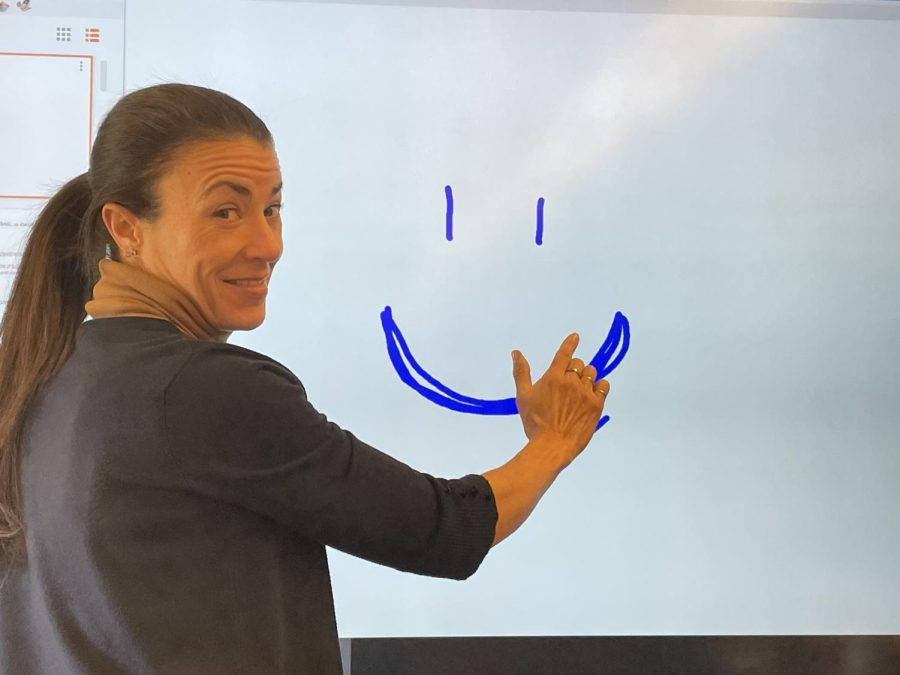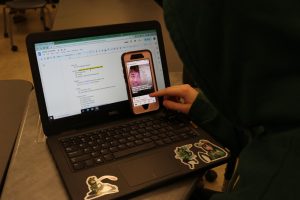Help Me, My Anxiety Spiked!
Mrs. Scholtz reminds students that happiness is the key.
November 29, 2022
Many people, including myself, forget how to cope with anxiety during an attack. We know that it isn’t just going to disappear on its own, so we need to figure out effective ways to cope.
What is anxiety? Anxiety is constantly worrying or having an intense fear about something. Some common effects of anxiety are nervousness, increased heart rate, hyperventilation, sweating, trembling, etc.
Anxiety can be caused by difficult experiences, genetics, stress buildup, drugs, alcohol, or different medical problems. Types of anxiety include but are not limited to Separation Anxiety, which is when you fear separation from someone. This is usually caused by childhood events. Social anxiety, which is the fear of having to socialize due to embarrassment and the fear of being judged. Panic disorder, which is sudden attacks that peak within minutes of when they start. Panic attacks do not have an apparent cause, they are random.
Anxiety can make you feel helpless at times. You can start to feel lost and even start to lose faith in yourself. You just need to believe in yourself, but if that is too hard to do at the moment, you can cope. Coping will help us deal with the anxiety during the attack, but in order to do that we need to figure out some of the best coping mechanisms.
Coping mechanisms can be found all around us, but many people who suffer from anxiety don’t realize. A way that we as a school district could help those who are struggling with anxiety is if teachers taught it in a class. A perfect class to teach coping skills is Wellness for Life. It is a great class because we already learn about anxiety and stress in a unit. Adding a little section on to the stress unit would be great.
Schools could teach different exercises that students could use during class. For example, box breathing and muscle tensing and relaxation. For the box breathing exercise you imagine a box and breath in for 4 seconds and breath out for 4 seconds. You do this twice to create a box. Muscle tensing and relaxation is just what it sounds like. You tense and relax. Students could do this during class without being noticed.
If wellness teachers taught these simple coping skills in class, students would be a little more relieved. It is a useful tool for any student, not just those suffering in the moment. Anybody could have an anxiety attack, and to be taught how to cope during class would help greatly.
Teachers should also teach how to cope at home. Sometimes attacks at home can be more severe and need more attention than just muscle tensing and box breathing. Sometimes you need to sit down and read a book, watch a show, or call a friend. Teachers could talk about all these simple ways to get rid of anxiety in the moment. If wellness teachers did this, students would know how to cope with anxiety at their house too.

Teachers should also explain how the coping mechanism helps your anxiety. For example, being with friends helps your anxiety by being a shoulder to lean on. Our friends are nonjudgmental, which means they will always be there for you, and listen to your struggles. They see all the positive things about us, that sometimes we don’t see. Therefore, friends increase our sense of belonging. They also improve our self confidence, which causes stress and anxiety to reduce during attacks.
Reading can lower heart rates making you feel calm. If you read a book your muscle tensions will ease and reduce anxiety. A study done by the University of Sussex states that if you read to help calm your anxiety down, your anxiety will end up decreasing by 68%.
Watching a show will help distract you in times of distress. If you are distracted and not worrying about what went on during your day your mind can finally relax, causing anxiety and stress to lower.
One more thing teachers could do is tell students that coping does not take the place of seeing a professional (therapist or counselor). Teachers should have an entire lesson about how speaking to professionals helps. Telling a friend about what is going on in the moment might help you, but a professional therapist will give you suggestions about what to do.
A therapist can give you more detailed coping mechanisms that are adjusted towards you. They can also give you feedback when you need it. They can tell you what you did wrong during this time of anxiety so that you can fix it in the future. If teachers told students to see a therapist if anxiety is getting bad, their anxiety could get better.
Anxiety might always be with you, but it doesn’t always need to be bad. If we learned coping skills in class it could help so many struggling students.












